By Martha Burr
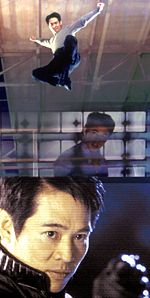 Last spring I visited Jet Li on the set of The One. They were shooting nights, in an old abandoned factory south of Los Angeles. Rusty water dripped, paint was peeling off the ancient pipes. I even had to wear a hardhat. Not a good hair day. When I came in Jet and Corey Yuen, his action choreographer, and a handful of other Hong Kong stuntmen, were busy blocking out a complex wirework stunt. After many long hours of grueling work, Jet sat down in his trailer with his usual smile and enthusiasm to discuss the movie. I also caught up with him later at the Four Seasons Hotel to discuss his summer film, Kiss of the Dragon.
Last spring I visited Jet Li on the set of The One. They were shooting nights, in an old abandoned factory south of Los Angeles. Rusty water dripped, paint was peeling off the ancient pipes. I even had to wear a hardhat. Not a good hair day. When I came in Jet and Corey Yuen, his action choreographer, and a handful of other Hong Kong stuntmen, were busy blocking out a complex wirework stunt. After many long hours of grueling work, Jet sat down in his trailer with his usual smile and enthusiasm to discuss the movie. I also caught up with him later at the Four Seasons Hotel to discuss his summer film, Kiss of the Dragon.
Between these conversations, as you?ll see, Jet had a great deal to say about his films, the martial art movie genre, and his philosophy of filmmaking and life. It was perhaps this philosophy that adds a moral dimension to his work that makes it so distinctive, setting him apart from his peers. Whether he?s talking about his Buddhism, concepts of circularity and balance, or responsibility to one?s family (and fans), Jet strikes you as someone who, despite having accomplished so much, still has enormous potential for greatness. We?ll undoubtedly see some of this in Jet?s next film that he is currently shooting in China, called Hero, directed by Zhang Yimou. The movie also stars Maggie Cheung, Tony Leung and Zhang Ziyi. Talk about a dream cast! And a $17 million budget will stretch a long way in China, so move over, Crouching Tiger...
Meanwhile, it's time to frolic around the universe with not one, but two Jets ? one heroically good, the other deliciously evil. Always an innovator, Jet has, not surprisingly, brought the kungfu movie genre to a new level by using the internal arts of bagua and xingyi as his characters face off. So without further ado, here's the man to tell you in his own words.
The Jet Li Interview
Q: In The One you play two characters, good and bad, and use different styles of martial arts to differentiate them. How did you develop this?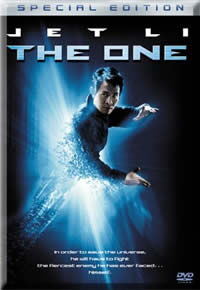
Jet Li: The writer is a friend of mine who helped me write The Kiss of the Dragon. He knows martial arts, so when I first got the script for The One, we don't have details about the characters, or what kind of martial arts they used. So, we tried to look at the character. Like I've said before, with an action movie, the most important thing is how you describe the character. And use martial arts to make this more clear. What are they thinking, what are they fighting? So I play two characters in this film, one is good, one is bad.
The bad guy, he uses Xingyi. Not exactly 100% xingyi. But straightforward. Because he wants to destroy everything. He wants to kills all of himself in different universes. So he tries to reach that goal. He wants to become the One. If you know xingyi it uses a very straight line.
But the other character is the good guy, Gabe, he doesn't know what?s going on. But suddenly the power is going through his body. His philosophy is more circular. He has a wonderful family, a beautiful wife, sweet dog, so he just wants to make a circle. Everything is balance. That's what I always talk about in my philosophy, that life needs to be balanced. If you think about the world, only man and no woman, then the world sooner or later is destroyed. Only woman, no man, doesn't work either. So, it's why he tries to protect his family. He believes in the circle. Bagua is the circle.
So we decide with these two characters, and we talked to Corey, and also James (Wong, the director), and everyone agreed that these two characters will work this way. It's unique, we?ve never seen it in an American film. Maybe a little bit in the HK films. Because, that kind of fight I think is three times harder than normal martial arts movement.
Some kinds of action movies, the actors, if they practice a few months they can do it. Use technology to help, use cables, practice with a good teacher. But this kind of martial art, xingyi and bagua, you really need to learn, a few years, maybe ten years, then you can control your body. Not just making your arm move straight forward, you really need your whole body, from inside to outside. Everything is working together.
Q: When you started trained bagua and xingyi you must have been very young...
Jet Li: Yes, when I was young, you know my background, I learned all kinds of wushu from internal to external, weapons, everything. Movies are quite different from real gungfu, real martial art, because when we're shooting, the angles are different, you need one movement to match the other guy's movement, so we cannot use 100% bagua or 100% xingyi, we just try to create something based on xingyi, based on bagua.
The whole ending we worked on four weeks. We have one part traditional action movie style, when the good character becomes angry, loses control, and wants to kill the bad guy. He loses his form. So, then he must calm down, relax, because he knows he can't win if he's so angry, if emotion isn?t calmed down, relaxed. So then the internal martial art comes out.
In all taiji or bagua is the energy, the qi, is calm, fluid, not excited. Or it doesn't work. So, the bad guy tries to kill him, but after awhile, he cannot kill him. He goes from being calm to being excited, and that's what causes him to lose. The personality in the character changes, the martial arts changes.
Q: So as the character develops, the martial arts must have to develop too?
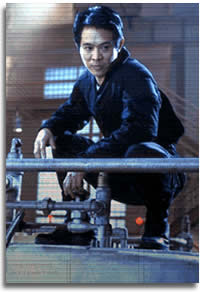 Jet Li: Yes, I?ve made a lot of films, but this is the hardest. Usually I play the good guy, and I fight, with the bad guy. Now, I need to fight with the stuntman, and when I finish my part I have to turn back to be the bad guy, and fight the stuntman again. Sometimes you hit the bad guy, and the stuntman turns around and hits you. So, it's quite hard (laughing) to do everything.
Jet Li: Yes, I?ve made a lot of films, but this is the hardest. Usually I play the good guy, and I fight, with the bad guy. Now, I need to fight with the stuntman, and when I finish my part I have to turn back to be the bad guy, and fight the stuntman again. Sometimes you hit the bad guy, and the stuntman turns around and hits you. So, it's quite hard (laughing) to do everything.
Q: Which do you enjoy playing more, good guy or bad guy?
Jet Li: Both have their character. You need to love both. If you don't love both characters it doesn't work. Everything comes from your heart. If you don't like the character, you can't play the character. You must enjoy what the character is thinking. I just, in a few months, try to become that person. Even the bad guy. He thought everything was clear, where he wants to go, what he wants to do. Very clear.
Then you need to forget the bad guy. The good guy's philosophy, you need to believe that, you need to love the character, then you can become the character. If it's not from here (he taps his heart) it doesn't stick.
Q: You've worked with Corey Yuen on 3 American movies now, Lethal Weapon 4, Romeo Must Die, and now The One. And one French movie, Kiss of the Dragon. How is your creative relationship, has it gotten to another level in this one since it?s more complex?
Jet Li: I've worked with Corey in many films for the past 10 years. It really depends on the story. Romeo Must Die is one kind of story. Also, we don?t know what an American audience wants to see, what do they like? Traditional Chinese martial art fighting style, or a modern style? I don't think it's very successful, really (laughs). So we did Kiss of the Dragon in Paris, and use streetfighting, hardcore fighting. Very straightforward, no cable, just hand to hand to hand, or gungfu to gungfu. We found a lot of good champions in Europe. In one scene I fight with 25 people.
But The One has more room for us to create new stuff because the character has the ability, he's not a normal person. He can jump higher, he can run faster, so that's why we can have more creative action for the character. Do something special. You have a reason, the audience understands. They're not just a normal person, normal cop. They can jump 10 feet high, suddenly.
It depends on the story, how you can create martial arts sequences. Of course, we try to create something new, and the audience is very smart. They've seen a lot of Hong Kong action movies, and in the past few years some HK action movies have become popular in the States. But if we don't create something new, I think they will tire soon.
We always want to do something we've never done before.
Q: Can you talk about some of the fight scenes?
 Jet Li: I think in this whole movie, of course the best scene is the ending. Usually American action movies spend 2 weeks, at most, on the ending scene. We spent 4 weeks, not including green screen. It's maybe a ten minute, twelve minute fight. There's a different kind of style for the first part of the fight, and for the second and third parts. I think it?s unusual. So you can really see for the first time, Jet Li fights Jet Li on the big screen.
Jet Li: I think in this whole movie, of course the best scene is the ending. Usually American action movies spend 2 weeks, at most, on the ending scene. We spent 4 weeks, not including green screen. It's maybe a ten minute, twelve minute fight. There's a different kind of style for the first part of the fight, and for the second and third parts. I think it?s unusual. So you can really see for the first time, Jet Li fights Jet Li on the big screen.
Q: Let's talk about this year's earlier movie. How did you come up with the idea for Kiss of the Dragon?
Jet Li: After Romeo Must Die a lot of hardcore Jet Li fans told me on my website they don?t like the action sequences, they thought it was too choppy, not clear. Not as good as my older films. I saw the Matrix and I knew how exactly the same way, ten years ago, the Hong Kong movie industry, after I did one movie flying around, suddenly you saw a hundred movies; everybody flying around! I knew that in the States the same thing would happen. So, I thought it would be the right time for me to do some hardcore fighting, with a strong character, that kind of action movie.
We (Luc Besson, the producer and Robert Kamen, writer) discussed it, and created it from the beginning, and then I think, three weeks later we have a script. Six weeks later we're shooting in Paris. Very quick. Because, we were talking about how different it is making movies in Asia and Europe and the States. When I saw how it was in Europe, it was very close to Asia. Like a small family, shake hands, do it. Everything has a lot of energy. Very quick.
Q: How did you come up with the story?
Jet Li: I like to talk to the audience, I like to ask them their opinion about my movie, so I get some information. They like Fist of Legend, that kind of action sequences, that style, so we try to mix Fist of Legend and The Professional, that kind of story. That's one kind of action movie. Another kind of action movie is the typical American action movie, you see the hero, they get in trouble, they try to solve the problem, then they save the day. Big hero.
This story focuses on a normal man, trying to do his job, he doesn't know how to deal with the girl. He gives the promise to the girl. Later on the character develops, because he has to do something to keep his word. Even if that something is against his job, his country. But he still needs to keep his word. It's a unique story. I like it very much.
It's a drama, really, everything has a reason to develop in the story, the character.
Q: So you're making a Hong Kong style movie with primarily as French cast, in Paris, but in English for the American market, how was that culturally?
Jet Li: I think that's why we want to do it this way. I think Hong Kong makes a lot of good action movies, but their production quality is not as good as American films. America has a lot of special talent, and creative people. They know the quality so well, then they put the Asian martial art in it, and make American action films. But we know the market has a lot of those kinds of films, that use cables, computer generated effects, that can make the actor and actresses trained in a few months do martial arts. We've seen this, so now maybe it?s time to do something different.
Luc Besson, he's quite creative as a producer, from his angle he sees things differently. Also, I think the Warchowsi brothers are very amazing, talented. They see a Hong Kong action move that's done a hundred times, but they use the other angle to see it. Tell it. And we think it's brand new. Amazing. But we know the movement is the same thing. But they see things differently. So that's what we want, to do something different, see something different.

Q: The action in this movie is very violent, maybe darker than a lot of your Hong Kong movies, how did you feel about that?
Jet Li: I think it is more real. In Hong Kong, we make a lot of action movies; usually we see that this character is a hero, he comes out the hero, fights from beginning to end, he's the hero. He never loses. That's why I think Luc is unique to create this character in the beginning. We don't want a superhero to save the day. Why not do something where this man is not perfect, a little bit selfish, who only works on what he's doing, doesn?t know how to deal with girls. Suddenly when the situation changes he's scared, he runs away, tries to figure out what's going on. You can see the movement from the beginning. He's very confident to fight inside the hotel. But after awhile, on the bateau-mouche, in the train station, he's afraid, he thinks that everybody is an enemy, he's nervous. More like a real person. Then, at the ending, he finds that a man's promise is very important. He needs to keep his promise. So he goes to the police station and he regains his confidence, when he needs to fight.
Q: What were the challenging scenes in Kiss of the Dragon?
Jet Li: It was hard fighting with all the fighters. We found around fifty fighters in Europe, from all over Europe. I feel very comfortable with the whole tone of the movie, the character, and the changing situations. When the situation changes, the fighting changes. The feeling is real. That's what we aimed for.
I always think that martial art, for an action movie, is not the most important point. The most important point is the story. And the character. When you like the character and the story, you use martial art to bring out the character.
Q: Can you talk a little about working with Bridget Fonda?
Jet Li: She?s a wonderful actress, and I'm glad Luc Besson decided to use her in this film. Usually, for action movies, the actress is a beautiful flower. They put the flower there, and then they fight. When they need the flower to come in, they bring her in. But this film, Bridget is the key. Between the good guy and he bad guy. She's in the middle, and makes the character make sense, the whole situation changes, and it's not just focused on fighting. Also, my character learns a lot of things from her, because I only work, work, work, never cares about the other person or what women think. In her life the most important thing is her baby, but I don't think about that because I'm quite selfish, I'm doing my job. But finally: the thought is very important - you need to take the responsibility to another person. So the character grew up.
Q: Can you discuss the acupuncture theme?
Jet Li: The writer came up with the name, Kiss of the Dragon. And when I was working two months later, in the middle of the shooting, I was thinking about this name. I thought maybe it was a good idea in the end to use your mouth with the needle to stop the bad guy, maybe that was a kiss of the dragon! You always want something creative, something the audience hasn't seen before.
I always focus on the reason to fight. If you don't want to fight, how do you stop them? They have guns, so I created acupuncture to stop people. That's it. I don't want to hurt you, I don't want you to hurt me. You also want to use it for healing people. To help people, also I think it's a nice thing. In real life, acupuncture can help physical ailments. I used it a lot of times, the doctor used it on me. But not a kiss of the dragon (laughs), it really doesn't go to that powerful a level. That's movie magic.
Q: Did you have a message to convey with this film? The importance of keeping a promise?
Jet Li: Yes. In my personal life I'm a very traditional Chinese person, and when you promise a girl something you need to do it. Also, in a lot of Asian audiences, and probably American too, the man wants to see the action movie, he's begging the girl to go see an action movie. But this time, I really want the girl to say, come on man, let's go see the movie. Because, remember your promise. I think the man needs to be honest, take a little responsibility. Whatever you do. That's my personal thought.
Q: You put a statement on your website telling parents not to take their children to this...
Jet Li: In the beginning we already decided that the martial arts is this way, it's hardcore fighting. We were very clear. I like to talk to the audience through the website, because I want to know their feelings about the movie. They give me good suggestions. I get thousands of e-mails every month, so I pick maybe forty, fifty questions to answer. One question comes from a mother who says, my little boy is really excited to watch Kiss of the Dragon... But I realize, I am a parent, I have a daughter fourteen months old, sometimes I walk with her in the mall and I see a lot of kids three years old, five years old, they say "hey, Jet Li, gungfu, yeah, yeah, yeah yeah!"
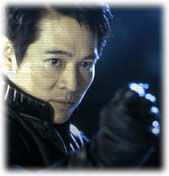
So, I suddenly think, uh oh, maybe I need to take some responsibility to answer that. I'm a father too. I say, I want to remind you, this is an art movie, for adults. You need to take the responsibility also because you need to decide how old your children are, and what to do. Maybe you watch it yourself, see the movie first, and see is it too violent, too hardcore, don't take your children. Every parent, they need to take the responsibility also.
You cannot make one film and make everybody happy. You make a PG movie, and your hardcore fans say, it's too soft. But in this film, I really want to talk about some message through this film. It really depends on what?s your focus. Next year I've decided to do a situation comedy.
Q: What are your thoughts on Asian films in US market now?
Jet Li: The audience created this market. They want to see American production with Hong Kong action, that's why you see a lot of this kind of movie. But if we don't do something new in the future the audience will get tired of it. For me, you try to forget everything you did in the past. Don't think about the future too much. Right now you do your best. You can't control things, even though you're waiting for something good, something bad, you don't know. It's a circle.
In these past few years the American martial art movie is quite popular but who knows? Maybe in another two years maybe it will go down, because the audience will be tired of people flying around. The movie business is always like a circle. Human life, also. But if you're always challenging yourself, do your best, then you can move around to different things.
Q: Is it true you passed on the Matrix part two?
Jet Li: Yes, part two and part three. (laughs) First of all, Warchowski brothers are friends of mine, we always talk about making movies, and they love Hong Kong action movies. And I liked Matrix part one a lot, I think it's a very successful movie, I can guarantee part two and part three will be successful. Why do you need Jet Li in it? They're already successful! Meanwhile, I have time to do my work. I make Kiss of the Dragon, I go back to China to make a Chinese movie, so I think this way the audience has more choice.
Q: You also turned down Crouching Tiger...why?
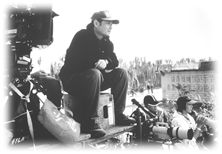 Jet Li: You see the movie, the man's promise in Kiss of the Dragon? The same reason. Ten years ago I promised my wife, I say we love each other, if we still do ten years later we'll be married, and if we have a baby I'll stop my working, and be with you until the baby is born. So for that reason I didn't do the film. Ang Lee had talked with me many, many years already, and we discussed how to make the film. I introduced him to the choreographer, Woo Ping. The whole production, I was involved with everything.
Jet Li: You see the movie, the man's promise in Kiss of the Dragon? The same reason. Ten years ago I promised my wife, I say we love each other, if we still do ten years later we'll be married, and if we have a baby I'll stop my working, and be with you until the baby is born. So for that reason I didn't do the film. Ang Lee had talked with me many, many years already, and we discussed how to make the film. I introduced him to the choreographer, Woo Ping. The whole production, I was involved with everything.
You can always create a good movie, but your life; you take care of your baby or wife. In your whole life you can find a lot of successful scripts, work with successful people. But in life, you need to really take responsibility to your family. And I thought that was more important than the movie.
Q: Why do you think Crouching Tiger didn't go over well with Asian audiences?
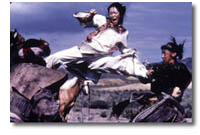 Jet Li: I think martial arts is like the ground, and the Hong Kong movie industry is like the tree. They make thousands of action movies already. For the past sixty years. So the Ang Lee movie is just like the flower, on the tree, they find the right timing, do the right thing, it's perfect, a big flower. If no ground, no tree; no tree, no flower. So the timing is very important. For American audience, they thought it was wonderful. But for an Asian audience, they say, I saw it a hundred times already. Similar movies, they fly around, the girl, etc. So it's a different culture. For America it was the right timing. I think if this movie had come out ten years ago in America, maybe it would be hard to find a theater to promote it in. Maybe the audience was not ready to watch this kind of film. Now the audience is ready.
Jet Li: I think martial arts is like the ground, and the Hong Kong movie industry is like the tree. They make thousands of action movies already. For the past sixty years. So the Ang Lee movie is just like the flower, on the tree, they find the right timing, do the right thing, it's perfect, a big flower. If no ground, no tree; no tree, no flower. So the timing is very important. For American audience, they thought it was wonderful. But for an Asian audience, they say, I saw it a hundred times already. Similar movies, they fly around, the girl, etc. So it's a different culture. For America it was the right timing. I think if this movie had come out ten years ago in America, maybe it would be hard to find a theater to promote it in. Maybe the audience was not ready to watch this kind of film. Now the audience is ready.
Q: How has life changed for you since you've moved to America? Do your fans ever overwhelm you?
Jet Li: When I was seventeen I made my first film, called The Shaolin Temple. I was already successful in all of Asia, wherever I went everybody knew me. Sometimes you feel at peace, sometimes you want to be alone. But right now I become Buddhist, and I study Buddhism. It's a good thing if you can make people happy, whether they're a little boy or an adult. When they see you they are so happy, they smile, you will be proud. If I can make them happy, I can spend more time talking with them in the mall, wherever I go, that's fine.
Q: What was biggest culture shock?
Jet Li: I think you really need to understand American culture, because everybody you meet says very nice things to you - you are great, you are brilliant, you?re amazing - I want to know is this true, or are they being polite? I really want to know, so I make my website to talk to the audience. They tell me the truth, they say, I like you in this, I don't like you in this. It's important. Because American people are so polite.
Q: You met Richard Nixon a long time ago, what was he like?
Jet Li: He asked me after I did a gungfu demonstration, do you want to become my bodyguard when you grow up? I say, nope. I don't want to protect one person, I want to protect a billion people.
Q: What was it like in Shaolin Temple when you went there to make your first film?
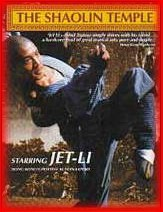 Jet Li: When I was working in Shaolin there were no monks, only 3 monks, and they had just finished the Cultural Revolution. Not a lot of people knew about the Shaolin Temple. After the movie came out it became very popular. A lot of tourists, a lot of martial arts schools. Remember, I'm just a normal guy, I'm lucky, learning martial arts. Now I?m lucky making films. One day I will retire. Just lucky.
Jet Li: When I was working in Shaolin there were no monks, only 3 monks, and they had just finished the Cultural Revolution. Not a lot of people knew about the Shaolin Temple. After the movie came out it became very popular. A lot of tourists, a lot of martial arts schools. Remember, I'm just a normal guy, I'm lucky, learning martial arts. Now I?m lucky making films. One day I will retire. Just lucky.
I remember when I was young, I really wanted to promote martial arts. In the 1970s I already had traveled to different countries, doing demonstrations. In the 1980s I started by making one movie. My eyes just opened. I saw a lot of people watching the movie, and they started liking the martial arts. Then I said, why not just continue making movies, and through the movies give out more information. I really want the martial arts to help the people. And one day it will be in the Olympics. In 1988 I say, now it's time to move on. So I leave the country, intending to make movies. I think in 2008, now, with the Olympics in Beijing, at that point martial arts will become an Olympic sport.
Q: Do you want to direct movies?
Jet Li: No. I'm not a good director. But I did produce nine movies in Hong Kong, and this I would like to do. I like to come up with a good story, and find a good writer to write it. Then you get the right people. Nobody can do everything.
Q: And what about your latest project?
Jet Li: I am shooting a movie called Hero, with Zhang Yimou directing. It's a Chinese film. For action movies, you can use martial arts to talk about love, maybe use martial arts to talk about what kind person you can call a hero. Through different kinds of angles you can see martial arts.
Q: What do you think about going back to work in China, and working with Zhang Yimou?
Jet Li: I think with satellite, the internet, cable, it makes the world become smaller. So it doesn't matter now, if the movie is made in Europe, in Asia, or the States, everybody wants to make an international movie. I think Zhang Yimou wants to make an international movie. He's never made an action movie, this is his first. Also, I think this will be the biggest production value martial art movie.
Ang Lee is also a great director, he makes an action movie, but he talks about love. Zhang Yimou makes an action movie also that doesn't focus on violence. Fighting. The name of the film is Hero. So the discussion is about what kind of person can become a hero. Not because you know martial art, or you know how to move physically.
Q: You're a Tibetan Buddhist, and how is this for you in China, if you go back to work on the Zhang Yimou film?
Jet Li: I think when you talk about religion, Buddhism is one kind of religion, and when you talk about religion you study it because you want to study what kind of person you are. Politics is politics. It?s different. I don't think they'll have any problems with me.
Q: Regarding your Buddhism, and other ideas, how important is it to have the philosophy behind the action?
Jet Li: You can't just teach teenagers what is right, what is wrong. I want to share with them, and let them choose what is good or bad. But a movie is only two hours, you cannot talk about a lot of ideas in one film. I just finished a TV show called The Invincible, and it focused on people needing to work together, they need to help each other. When you?re angry at somebody, even when you punch somebody, the bad energy comes out, you make that person become bad. If you love him first, you want to change him. Even the movement, the love energy comes out. So you want to talk about a different way, different levels. In the beginning, first, you say here's martial art, and they say, Oh, I'm interested in martial arts because you can kick somebody's ass. But then you want to talk about more. I will make another film that talks about a monk in NY, a monk from Tibet that goes to NY. It's more focused on the next level.
Violence won't give you solutions, you have to change the other person's personality.
The television show talks about a different angle to see the martial arts. It's a similar thing with the gun. The bad guy uses a gun to become bad. The good guy uses a gun to become good. The martial art, physical movement doesn't represent anything. You represent how to use the martial art. If you can use it to help people understand, then it's better.
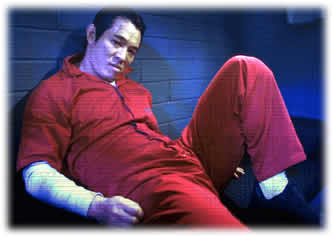
Q: When will we see these projects?
Jet Li: Next year I will make the monk movie. The Invincible will come out this fall. Mel Gibson and I produced together. Neither of us are in it, but the story is my story. Billy Zane stars in it. Tony Chen is the choreographer.
After Lethal Weapon 4 Mel came to me, he's such a great guy. He?s honest, funny, has a lot of energy. He says Jet, if you want to do something, I support you. I say I want to do television because with TV, every week, you have more time to talk about some philosophy, not just physical moves. So, we developed the whole TV series. We did a 2 hour pilot.
Q: Is LA, where you live now, and with the movie business here, is it an easy place or a tough place to keep the kind of integrity you've been talking about?
Jet Li: The outside always changes, the studios, the producers. But you have to think about it. You have to think about the situation outside your body. You think they?re tough, they're tough. If you think it?s easy, it's easy. It really depends on what's your point of view. What you want to get. You want to get famous? You want to become rich? What do you want to get? If I think, I only want to work, do my best, that's it. You give me more money, more fame, it's OK. You don?t give it to me, I go home. That's very easy. Just relax. Enjoy life. Do your best.
Click here for Feature Articles from this issue and others published in
2001 .
Written by Martha Burr for KUNGFUMAGAZINE.COM
![]() Print Friendly Version of This Article
Print Friendly Version of This Article












